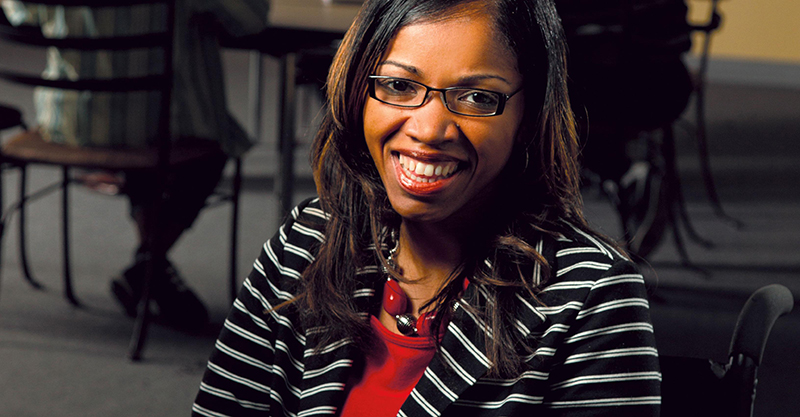
TyKiah Wright, Founder/CEO of WrightChoice, Inc. Credit: Courtesy of Katherine Betts.
Andrew Sydlik is blind. In order to attend classes, the Ph. D. student studying disability studies and 19th-century American literature must order special textbooks in advance to convert them into a format he can read.
Sydlik is one of the many members of the Ohio State community with a disability who has been affected by the Americans with Disabilities Act, a federal law which prohibits discrimination against people with disabilities in the workplace and in public areas.
2015 marks the 25th anniversary of the ADA, and to celebrate the 25-year milestone, the university will launch a yearlong exploration of the theme “claiming our space in the Ohio State mosaic,” which will include talks, , spoken-word and live performances, and kick-off with a speech by TyKiah Wright, founder and CEO of WrightChoice, Inc.
To launch the series, an inaugural reception will be held in the Ohio Union Great Hall Meeting Rooms on Wednesday, between 5:30 and 7 p.m. Students will have an opportunity to explore the narratives of individuals with disabilities and how they help shape the campus climate and culture.
“As a staff member with a physical disability, I’m aware that in many spaces where I am, the world was not designed with my needs in mind,” Katherine Betts, the program coordinator said. “I try to use opportunities in my professional capacity to be a voice for a community that is often unintentionally not considered during the onset of planning processes.”
Betts said that she had found support through coordinators in the Office of the ADA Coordinator’s Office and her colleagues in Disability Services, who have worked diligently to provide access and advocacy.
“Throughout my time at OSU, I have had the opportunity to build wonderful relationships with people who are supportive and help to create a welcoming space for my authentic participation in the OSU community,” Betts said. “I hope that, through my relationships across campus, other staff members will begin to intentionally consider individuals with disabilities and how we might interface with their work.”
Sydlik is also a secretary for the Disability Studies Graduate Student Association, which will be working with ODSS on future events in the series. He said that recognition of ADA’s legacy, as well as investigating the unmet needs of those with disabilities on campus, will help to strengthen the initiatives already in place.
“Other than the small but dedicated group of people who make these things happen, many people on campus still know very little about disability issues,” Sydlik said. “And many experiences are still inaccessible to a lot of people, whether faculty, staff or students.”
Sydlik said that in classes when other social issues related to gender, race or class are discussed, disability is rarely mentioned. “So if it’s relevant, I introduce concerns about disability into the conversation,” he said.
There are very few faculty who teach Disability Studies, and there are few who think about accessibility issues when they structure their courses, Sydlik said.
“I’ve personally encountered a few situations where class activities have involved something inaccessible to me — going to a computer lab without accessible software, or going to the Rare Books and Manuscripts Library without being able to access the materials,” he said.
Sydlik said that there needs to be greater support from the university as a whole to funding and promoting programs such as the ADA celebration and added that the greatest challenge is for multiple departments to talk to each other, clarify communication and get on the same page about the needs and options for those with disabilities.
“Everything is greatly decentralized, and often people who are doing great things don’t know who each other are, and people don’t even know what resources are available,” Sydlik said.
Sydlik added that the faculty needs to be much more informed, and offices providing services also need to be aware of the needs of the demands of both faculty and students when trying to support someone.
“The vision behind the ADA celebration is to bring people together to form the community atmosphere that we need to get people together, take the needed action and rally for greater support from the place we love to study, work and play at,” Sydlik said.
Betts said that creating the equitable space where the voices of the disability community are represented in every aspect of the university is the responsibility of the entire university community and not just the offices who provide specific services.
“One of the areas where I believe OSU struggles is continuing to define our commitment to disability through a framework of compliance when as a university we need to move toward full inclusion,” Betts said. “So intentional institutional efforts that promote equitable practices such as the Women’s Place would be ideal to move OSU towards fostering a more inclusive working environment for people with disabilities. A university-wide celebration of this historic moment provides an opportunity for the disability community to see themselves reflected within the OSU mosaic community.”


